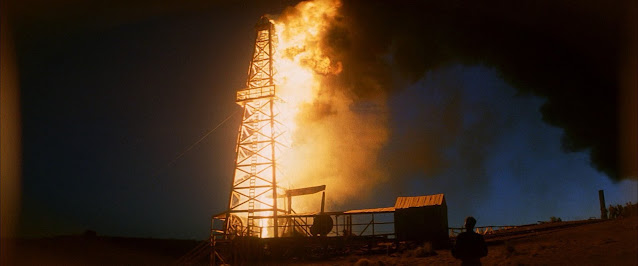There Will Be Blood is a largely tonal film, made great by its beautiful cinematography, soundtrack, performances, set design, direction, and creative use of lenses. It evokes the feel of a 1950s frontier film in look and
style but done expertly with modern technology. There's also a lot of
metaphorical elements and symbolism in the film (e.g. marking the baby's
forehead with oil) like is common with all the great writer-directors.
Somehow,
P. T. Anderson beautifully photographs near-impossible scenes. In a
way the whole movie is a metaphor for a man making it alone. It begins
with the protagonist alone in a black hole maybe 50 foot deep, in
struggle and in toil, with nothing but tools and a few explosives. He
gets the gold. Only in scenes a few years later does he have a few more
men, paid workers and believers in his vision, as he experiments and
invents in ways to secure oil.
He continues, with an orphaned
boy and a fake backstory to continue his career as an oil man. He has
finally made himself a success and is a man of considerable talent. His
con helps him succeed at the cost of isolating him. There's not too much
violence for a film titled There Will Be Blood, making you question its
title. Perhaps it's meant as ironic. There's no blood-ties. There's no
familiar familial comfort in Daniel's life. His son isn't his. When
Henry asks about his son's mother, he doesn't want to talk. He can't
bear to lie more, especially to his brother. He doesn't enjoy or desire to
explain himself in any capacity.
Of course, his brother isn't
blood, either. Daniel has no connection to family. From not wanting to share any of his
motivations, he finally opens up with Henry about wanting to own the nice
house in the neighborhood, to have it, live in it, clean it, even raise
children in it. This is the first time in seemingly his adult life
Daniel has been honest with someone about his desires and moments later,
he sees through Henry's deception. Henry says he knew a man who claimed
to be Daniel's brother who died of tuberculous and used his story, there's a potential
subtext where Henry may have killed him. When confronted Henry claims to
be his friend and he's correct. The bond of them both being cons,
similar in intent and manner, binds them more strongly than blood could.
Daniel kills what is essentially his shameful shadow.
Daniel
also has a lot in common with Eli, the false prophet. Daniel uses a
child to sell a vision, Eli uses a church. They both manipulate. Daniel
is better and can bully Eli. In turn, the rich, established oilmen try
to psyche Daniel out into selling his property. You can see Daniel's
insecurity as the self-made man from simpler means, as he grandstands
before them upon succeeding without them. The oilmen see Daniel as he
sees Eli, unworthy of their company, let alone as equal business
partners.
Unlike The Master this story is more or less straight
forward. Daniel Plainview might just be pathological pride, drive, greed
and insecurity taken to its natural conclusion. He's chosen a life of
success even over moral values, which blocks out the possibility of any
love he may desire. Throughout the film there are cracks in his
highly-driven, hellbent exterior where what's left of his humanity breaks
through, often in his affinity for children.
If I were to speculate
on why Plainview despises people, the first hint would be the irony of his
last name. We see him make his own way, alone. Nothing was given to him,
so why would he give any person a benefit of doubt. He sees simple people with
disdain because they lack his intelligence, they lack a capacity for
evil or to even see it as such. Daniel's dog-eat-dog mentality brings
him riches, but he's not intelligent enough to see it brings him misery
and a lack of closeness with those he loves. In the end all he has left
are material possessions and pride. Were Daniel to admit the truth of his
cons to himself the cost would be to see his life as empty, but also
endear himself to others and to an extent gain sympathy.
The
only time Daniel is forced to confront himself is during the baptism
scene with Eli. Though Daniel views the church as a fraud, the
humiliation he experiences here is the closest he ever is to human. So
deep is his aversion to shame, when he enacts revenge toward the end of
the film he can punctuate his life with pride by proclaiming, "I'm finished!"

No comments:
Post a Comment